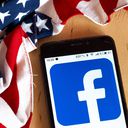Facebook's pre-election restrictions didn't dent political ad reach

Americans saw more political ads on Facebook in the week before the 2020 election than they did the prior week despite the company's blackout on new political ads during that period, according to Global Witness, a human rights group that espouses tech regulation.
Why it matters: The presidential election was a key stress test for Facebook and other leading online platforms looking to prove that they can curb misinformation. Critics contend measures like the new-ad blackout barely made a dent.
Yes, but: The company never intended for the new-ad blackout period to diminish the reach of political advertising. Rather, it helped Facebook avoid showing last-minute ads that might have misleading messages — aimed, say, at discouraging people from voting — which the company would not have had time to review and block.
- "Requiring all political ads to be submitted 10 days before the election ensured our political ads library was fully populated in advance — and that all the ads would be available for scrutiny," a spokesperson said in a statement supplied to Global Witness. "This was an important measure to combat misinformation and it helped."
The other side: "Transparency is just a starting point," Naomi Hirst, head of the Digital Threats Campaign at Global Witness, said in a statement, adding that it was "an impossible job" for outside fact checkers and the general public to gauge whether certain ads were problematic.
- "Moreover, Facebook’s ad library doesn’t allow civil society to see how ads were micro-targeted, preventing anyone from outside the platform from knowing whether an ad was targeted in a polarizing or discriminatory way."
By the numbers: In its research, shared exclusively with Axios, Global Witness found that, per data derived from the Facebook Ad Library:
- Political ads were shown roughly 5.3 billion times on Facebook in the U.S. in the week before the election, a 5% increase over the prior week.
- Facebook took in an around $110 million from political ads in the week before the election, just 4% below the prior week.
Where it stands: Facebook also imposed a total freeze on U.S. political advertising that took effect immediately after polls closed. That ban has remained in place ever since, as misinformation has swirled about the processes and results of the election.
Editor's note: This story has been updated to clarify the distinction between Facebook's pre-election blackout of new political ads and its post-election ban on all political ads.